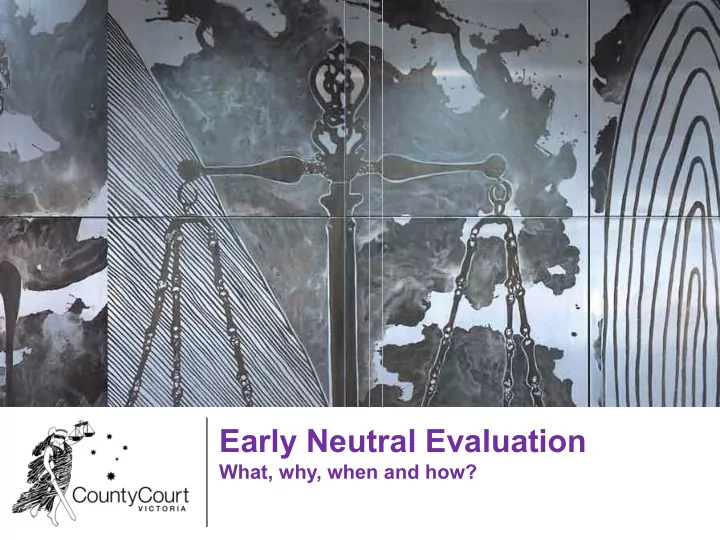

Early Neutral Evaluation What, why, when and how?
Early Neutral Evaluation What? Civil Procedure Act 2010 s3: appropriate dispute resolution means a process attended, or participated in by a Introducing counsel and experts party for the purposes of negotiating a settlement of the civil proceeding or resolving or narrowing the issues in dispute, including, but not limited to- (a) mediation… (b) early neutral evaluation; (c) judicial resolution conference; …
Early Neutral Evaluation What? Civil Procedure Act 2010 s3: judicial resolution conference [means] a resolution process presided over by a Introducing counsel and experts judge…or…a judicial registrar for the purposes of negotiating a settlement of a dispute, including, but not limited to- (i) mediation… (ii) early neutral evaluation; (iii) settlement conference; (iv) conciliation”
Early Neutral Evaluation What? Civil Procedure Act 2010 s66: (1) A court may make an order referring a civil Introducing counsel and experts proceeding, or part of a civil proceeding, to appropriate dispute resolution. (2) Subject to any rules of court, an order under subsection (1) may be made without the consent of the parties [if the ADR is ENE]
Early Neutral Evaluation What? Civil Procedure Act 2010 s67: If a court orders that a judicial resolution Introducing counsel and experts conference be conducted in relation to a civil proceeding, no evidence shall be admitted of anything said or done by in person in the course of the conduct of the judicial resolution conference unless the court otherwise orders, having regard to the interests of justice and fairness
Early Neutral Evaluation What? Seals v Williams [2015] EWHC 1829 (Ch): [ A] judge will evaluate the respective parties' cases in a direct way and may well provide an Introducing counsel and experts authoritative (albeit provisional) view of the legal issues at the heart of the case and an experienced evaluation of the strength of the evidence available to deploy in addressing those legal issues. The process is particularly useful where the parties have very differing views of the prospect of success and perhaps an inadequate understanding of the risks of litigation itself.
Early Neutral Evaluation What? Truncated presentation of each party’s case Limited agreed documents and evidence No cross-examination Introducing counsel and experts Interactive Inclusive Considered brief reasons, including discussion of strengths and weaknesses Advice on liability and evidence?
Early Neutral Evaluation Why? Used successfully for many years overseas (notably the UK and US) Successfully adopted in the Magistrates’ Court Introducing counsel and experts since 2010 Queensland “case appraisal” – UCPR 1999, Chapter 9, Division 4 (r334-345) o Comprehensive set of rules and procedures o Cost consequences County Court BCL?
Early Neutral Evaluation Why? Without prejudice and non-binding More formal – “day in court” Flexible process – can morph into a JRC Introducing counsel and experts As with JRC and mediation: o Client involvement and ownership of outcome o Significant cost saving if resolves If does not resolve – opportunity to assess case and address gaps (dress rehearsal) But cost?
Early Neutral Evaluation When? (Timing) ENE vs NNE As early as possible Pre or post: Introducing counsel and experts o discovery? o expert evidence? o witness statements or outlines?
Early Neutral Evaluation When? (Suitability) Credit not seriously in issue Costs likely to overshadow claim Difficult clients Introducing counsel and experts Limited resources Urgency (or in a pandemic!) Why BCL?
Early Neutral Evaluation How? Orders providing for: ENE Book of Documents o Summary statement of issues o Chronology Introducing counsel and experts o Bundle of key documents (including expert reports) Written outlines of evidence and argument on facts and law Attendance at hearing of parties (as per mediation) Hearing
Early Neutral Evaluation How? Written reasons All outlines etc and reasons without prejudice Time to notify if settled Introducing counsel and experts OR Cost consequences on failure to accept (Qld model o “Rejection notice” o Stands as offer of compromise o Or Calderbank offer
Early Neutral Evaluation Examples Introducing counsel and experts
Recommend
More recommend